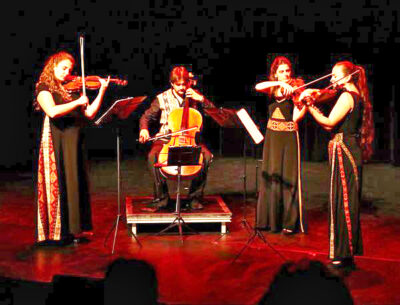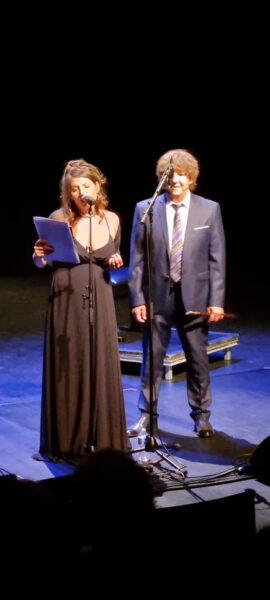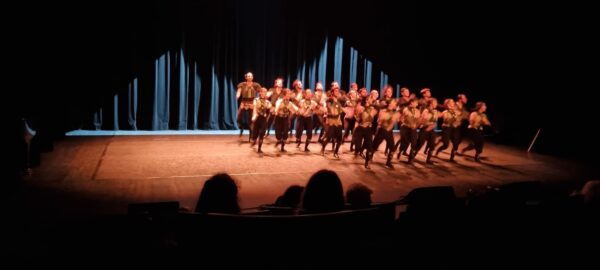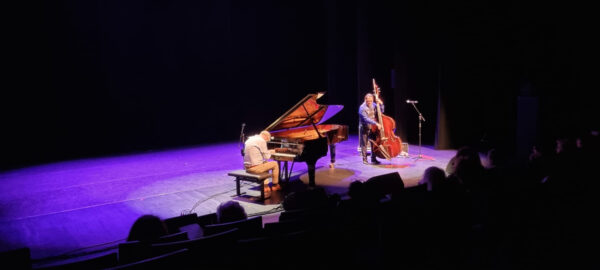
Akhtamar quartet Colin Alecian first violin, Cyril Simon Cello, Jennifer Pio second violin, Ondine Stasyk Viola (L’dy photo)
Paris Gala for Artsakh: ‘One Nation, One Culture, One Child, One Hope’
by Muriel Mirak-Weissbach
the Armenian Mirror Spectator
PARIS, SEPTEMBER 21, 2023 – “Wars may come to an end, but traumas last for a long time thereafter. All wars present the same forms of horror, and they leave survivors with weighty handicaps, both visible and invisible.” These are the words of Eugénie Alecian, a leading French-Armenian musician and composer. And the most seriously affected, she adds, are children and their families. It is this awareness that has motivated Alecian to lend her support to the efforts of Santé Arménie (Health Armenia), a non-profit association of doctors and psychologists who are offering psychiatric and child-psychiatric care, not only as immediate relief, but as long-term support for children and their families in Armenia and Artsakh.
To this end, as founder and president of Action Musicale Internationale, Alecian decided to organize a charity gala event in Paris to raise funds for Santé Arménie on September 16, at Espace Carpeaux, in the Courbevoie commune.
Santé Arménie came into being on the initiative of Prof. Arsène Mekinian (Internal Medicine Department, Hôpital Saint-Antoine, Paris) in partnership with AGBU France, following the September 2020 war on Artsakh. Volunteer healthcare professionals from France, Belgium and Switzerland intervened immediately with medical assistance for the victims, and followed up with working groups (now numbering 22) to help develop the healthcare system in Armenia and Artsakh for the longer term. Their four priority areas are care and infrastructure reinforcement, training and transfer of expertise, research and development, and partnership with Armenian institutions.
Devoting particular attention to the needs of the traumatized, Santé Arménie, which cooperates with other French medical missions in Armenia and Artsakh, has proposed projects reinforcing the treatment of psycho-trauma. These include the creation of a chair in child psychiatry — the first in Armenia — which is an inter-university project between Yerevan State University and Université Paris Est Créteil; and, partnership with Arevamanuk Psycho-Social Support Foundation, to strengthen psychotherapy support, with remuneration of 14 psychologists in Yerevan, Dilijan, and Gyumri to provide psycho-trauma care for military personnel, their families and, more generally, the entire Armenian civilian population. In addition, projects offer psychological and psychiatric care in the Syunik region, including support group therapy for teenagers; and, mobile units in Artsakh in partnership with the Empathia Consultation Center. Directing these ambitious initiatives are the leaders of the psycho-trauma team, Dr. Irene Nigolian, Dr. Anahit Dasseux-Ter Mesropian, Dr. Sevan Minassian and Dr. Patrick Alecian.
Dr. Patrick Alecian is musician Eugenie’s brother. He has worked in child protection since 1982, and is specialized in trauma and post-traumatic changes in children and adolescents. Currently he is training a medical and psychological corps in Armenia to deal with the devastating effects of almost 40 years of conflict.

Taline Kortian and Levon Minassian (Photo Wasmuth)
Raising Awareness
The gala event, held under the patronage of the Embassy of Armenia in France, Yerevan Medical University (YSMU), Yerevan, National Psychiatric Association, National Association of Armenian Veterans and Resistance Fighters (ANACRA), and enjoying the support of Mayor Jacques Kossowski, offered two sessions, a discussion among experts and an exceptional music program.
The afternoon opened with a round table on Armenia: 1894 – 2023, Patrick Alecian introduced the discussion with remarks on “History and its repetitions, when denials become weapons.” He located the subject of childhood in chaos within the broad expanse of history.
“What I want to introduce,” he said, “is the need to understand the persecution of Armenians from 1894 in Anatolia to today in the Caucasus as a continuum, seeking an erasure of all their footprints. From this reality we must understand the childhood of Armenians in the eyes of a mirror broken into 8 million splinters. Each of these splinters carries a capacity for revival, but to this day the mirror remains broken.” It was the task of the symposium to explore and analyze the multiple and transgenerational effects of the persecution in the search for therapeutic means to promote a revival.
Next up was historian Claude Mutafian, on “The different Armenian diasporas,” and ANACRA Vice-President Léon Hovnanian whose theme was “Between war and childhood, the work of remembrance.” Arsène Mekinian, professor of internal medicine and founding president of Santé Arménie spoke, as did Anne-Marie Royer, who presented her specialized field, “Child psychiatry and child protection: an indispensable union.” The session concluded with “Adolescents, their place in the care system, their needs and expectations,” presented by Sevan Minassian, also a child psychiatrist associated with Santé Arménie. The special guest was Philippe Juvin, anesthetist and intensive care physician, university professor, Head of the Emergency Department at the Hôpital Européen Georges Pompidou, and Member of the French Parliament.

YERAZ Dance Company (Photo Wasmuth)
From Trauma to Music
To end the day, a group of extremely talented instrumentalists, singers and dancers joined in a tribute to their shared French and Armenian heritage, with traditional and contemporary art, classical, and jazz. Like all participants in the day’s gala event, they volunteered their talents and art.
It was not a “normal” concert. Eugenie Alecian had invited Taline Kortian, the professor and author, to be mistress of ceremonies, or “Tamadah,” as she said, someone who proposes toasts. She would lend meaning to the transition from words to music, as one would move from the negative, the pain and suffering, without forgetting, but shifting the focus to where the eyes lead, to the future, to a tomorrow of justice and dignity, far from the horrors of war.
And yet, she felt bound to describe once again that horror — the horror of the 44-day Karabakh war, which she has written about. Kortian read from the text of a piece called “J’accuse,” (I accuse) she had published in the Revue des deux mondes. The text (whose title recalls that of Emile Zola’s letter in reaction to the Dreyfus affair), is impossible to summarize, but one may characterize it as a dramatic evocation/description lamenting the suffering of the Nagorno-Karabakh blockade, followed by a series of accusations addressed to those bearing direct or indirect responsibility: from Ilham Aliyev, the perpetrator, to Recep Tayyip Erdogan, his military supporter, from Israel, a weapons provider, to Europe, purchaser of Azerbaijan’s gas, from Russia, the unprotecting protector, and France, shedding “crocodile tears;” from NATO, for kowtowing to Turkey, and the UN for not sending peacekeepers, to the international community, for its failure to organize an air lift.

Pierre Boussaguet and Giovanni Mirabassi (Photo Wasmuth)
Taline Kortian moved then to introduce the musicians, first Levon Minassian. Recalling the names of the many great artists he has accompanied, the number of films and recordings featuring him, she introduced him, on the duduk, with Serge Arribas on the piano. Citing, singing from Armenian melodies, interspersed with echoes of the Artsakh drama, Kortian, she said Levon Minassian’s did not belong to folklore, “museum of dead souls resuscitated,” nor to any geographically defined space, but to a sphere beyond time and space, where the soul rediscovers its unity. Levon Minassian then appeared, with Serge Arribas who has accompanied him for 30 years.
Performers included the Akhtamar Quartet from Brussels, France, and Armenia; the Troup’Adour choir, directed by Onnick Adourian; Pierre Boussaguet (double bass) and Giovanni Mirabassi (piano); Ingmar Lazar (piano); Jean-Samuel Bez (violin); and The YERAZ dance company. Works were performed by Sayat Nova, Komitas, Komitas/ Aslamazian, Judith Adler De Oliveira, Pierre Boussaguet, Ravel, Tatoul Altounian, Giovanni Mirabassi, Eugénie Alecian, Beethoven, Edgar Hovhanessian and Charles Aznavour…